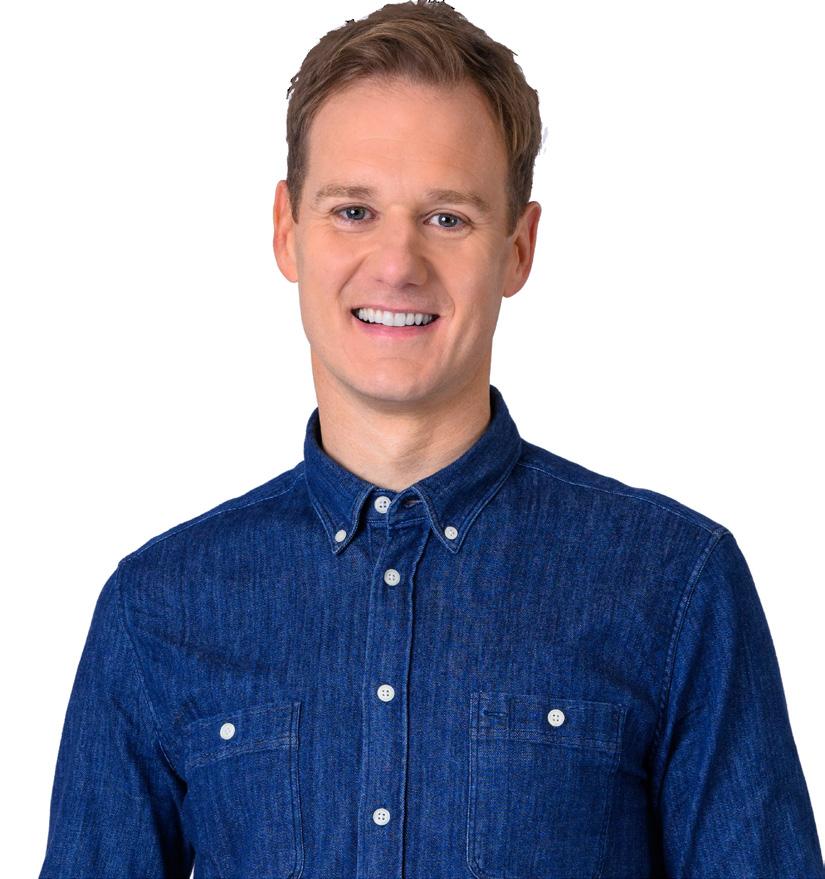Music Hall, Aberdeen Thu 3 Oct 2024 7.30pm




Music Hall, Aberdeen Thu 3 Oct 2024 7.30pm



Music Hall, Aberdeen Thu 3 Oct 2024 7.30pm
Let Scotland’s National Orchestra whisk you away on a musical adventure! RSNO Principal Oboe Adrian Wilson takes centre stage in Richard Strauss’ light and playful Oboe Concerto. Meanwhile, Music Director Thomas Søndergård takes on the trolls in Alfvén’s little heard but immensely tuneful suite from his balletpantomime Bergakungen, and then in Grieg’s stunning Peer Gynt Suites. From the sunlit vistas of Morning to the terrors of In the Hall of the Mountain King, enjoy these stirring melodies magically brought to life by the RSNO.
ALFVÉN Bergakungen (The Mountain King) Suite Op37A [16’]
R STRAUSS Oboe Concerto [26’]
GRIEG Peer Gynt Suites No1 Op46 [13’] and No2 Op55 [16’]
Thomas Søndergård Conductor
Adrian Wilson Oboe
Royal Scottish National Orchestra
If viewing these notes at the concert, please do so considerately and not during performances. Please silence all mobile telephones and alerts, and refrain from taking photographs, without flash, until the end of each piece.
Supported by RSNO Patrons
ABN Thu 6 Mar 2025
EDN Fri 7 Mar
GLW Sat 8 Mar

Farrenc Overture No2
Rachmaninov Piano Concerto No3
Bartók Concerto for Orchestra
Lionel Bringuier Conductor
Jonathan Mamora Piano

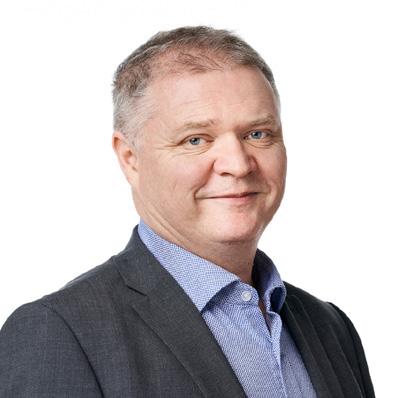
It is my pleasure to welcome you to the opening concert of the RSNO’s 2024:25 Concert Season.
We’ve kept busy since our last visit to the Music Hall, performing at the Edinburgh International Festival with former Principal Guest Conductor Elim Chan and trumpet soloist Alison Balsom, touring Scottish primary schools in partnership with digital education platform Charanga, and recording for film, television, game and classical distribution. Much of our recording work must remain secret; however, the Orchestra is proud to have featured on two recent major releases: Star Wars Outlaws, a video game published by Ubisoft, and Our Gilded Veins, an album featuring the work of the same name performed by our own Katherine Bryan and For Zoe, written in memory of former RSNO cor anglais Zoe Kitson and performed by Henry Clay. I recommend you listen if you haven’t already.
This evening’s programme includes a showcase performance from another of our woodwind principals, Adrian Wilson. Adrian recently celebrated 10 years with the RSNO and we’re excited to hear what he’ll bring to Richard Strauss’ Oboe Concerto. We are very fortunate to have such talented soloists in our midst and it’s a delight to enable them to take centre stage.
Keen observers will also notice some new names in our list of permanent Orchestra members. Over the summer we appointed Kirstin Drew and Colin McKee to the Second Violins and Moray Jones and Alexandre Cruz dos Santos to the Double Basses. I wish them all every success in their new positions.
The Orchestra is led tonight by Thomas Søndergård, celebrating his seventh Season as Music Director. Thomas is increasingly in demand around the world, performing this year with the esteemed New York and Los Angeles Philharmonic Orchestras, yet it is not difficult to persuade him to return to Scotland, especially when we have audiences like you!
Thank you for continuing to support the RSNO in Aberdeen and I look forward to sharing the rest of the Season with you.
Alistair Mackie CHIEF EXECUTIVE













































































Thomas
Tom
Jacqueline
Kirstin
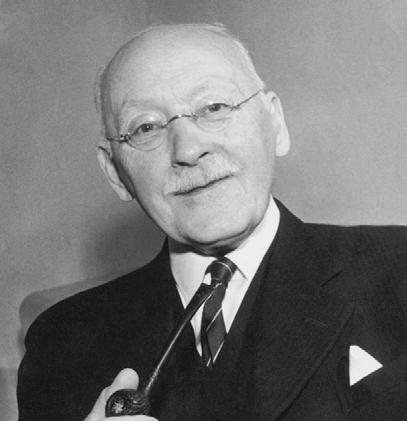
FIRST PERFORMANCE
Full ballet-pantomime: Stockholm, 7 February 1923
DURATION 16 minutes
1. Bersvarjelse (Invocation)
2. Trollfickans dans (Dance of the Troll Maiden)
3. Sommarregn (Summer Rain)
4. Vallflickans dans (Dance of the Shepherd Girl)
It’s fascinating to stop and consider just what a debt of thanks is owed by today’s symphonic world to the ballet world of the early 20th century. Debussy’s Jeux (1913); Stravinsky’s The Rite of Spring (1913); Ravel’s La Valse and Bolero (1920 and 1928); Milhaud’s Le Boeuf sur le Toit (1920); all of these masterpieces began life as ballet commissions before finding their final nesting places in the concert hall, and while Hugo Alfvén’s ballet-pantomime Bergakungen of 1922 isn’t quite as famous as those aforementioned examples – many of which were Ballets Russes commissions from Sergei Diaghilev – not only does it likewise display some of Alfvén’s own very best writing, but it was written for Diaghilev’s rival, Swedish National Ballet’s Jean Börlin.
Written between 1917 and 1922, the ballet is based on the Swedish legend of Den Bergtagna or The Mountain King, who abducts a shepherdess. The shepherdess is rescued by her lover with the help of a troll, but the troll leaves the couple to die in a snowstorm, having become frustrated that he can’t have the shepherdess for himself. So it’s a gloomy tale, and Alfvén’s music was underpinned by further dark inspiration. First, because the story was originally mooted as a possible ballet by the painter and illustrator John Bauer, whose own dark-toned, folkloric illustrations of monsters and sprites were uncannily similar to the work of Arthur Rackham in England. And second, because in November 1918 Bauer died in a shipwreck on Lake Vättern, temporarily suspending the project. Consequently, it wasn’t until 1923 that the ballet was finally premiered at Stockholm Opera, and while it would be briefly revived in 1931 and 1932, Alfvén rightly guessed that as a stage work it wasn’t going to have longevity, hence creating the four-movement concert suite we know today.
We can all be grateful that he did. Beyond being a skilled composer who in his time was as established as his compatriot Wilhelm Stenhammar, Alfvén was also a gifted violinist, painter and writer, and all these elements shine out from his shimmering, lushly textured, colourful score replete with virtuosic strings writing. First comes Invocation, making clever programmatic use of dark woodwind, brass and percussion colour against shrill, rushing high violins; and of panic-stricken accents and ominously accelerating tempi. Dance of the Troll Maiden serves up magic-flecked romance, with sumptuous, long-lined Straussian writing coloured by harp building to a passionate climax, before subsiding to close. Summer Rain is a dazzlingly perfect orchestral evocation of exactly that, magical pointillistic writing cushioning long-lined woodwind song. Finally, Dance of the Shepherd Girl, a long-time favourite encore for Swedish orchestras, encases a dreamy central section within merry, feather-light outer sections which serve as a brilliant showcase for ensemble violins’ virtuosity.
© Charlotte Gardner
19 Feb Jean Sibelius conducted the premiere of his Sixth Symphony in Helsinki
20 Mar Original Drawings by Pablo Picasso, which opened at the Arts Club of Chicago, was the artist’s first US show
4 Apr Warner Bros. Pictures Inc. was incorporated in the US
11 Apr The Shadow of a Gunman, the first play in Seán O’Casey’s Dublin Trilogy, opened at the city’s Abbey Theatre
9 May The premiere of Bertolt Brecht’s In the Jungle of Cities in Munich was disrupted by Nazi demonstrators
11 May Dorothy L Sayers’ fictional detective Lord Peter Wimsey made his first appearance in Whose Body?
Sep Leonard and Virginia Woolf’s Hogarth Press published T S Eliot’s The Waste Land in book form for the first time in the UK
16 Oct Brothers Walt and Roy O Disney established Disney Brothers Studio (later Walt Disney Productions)
28 Dec George Bernard Shaw’s Saint Joan premiered at New York’s Garrick Theatre, with Winifred Lenihan in the title role
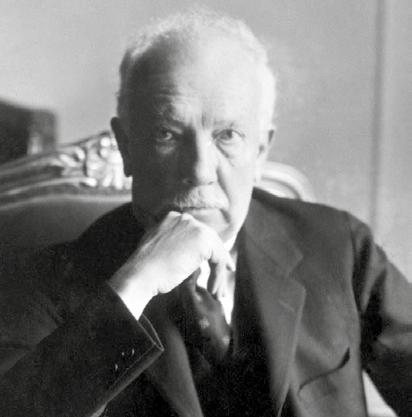
FIRST PERFORMANCE
Zurich, 26 February 1946
DURATION 26 minutes
1. Allegro moderato
2. Andante
3. Vivace-allegro
Once the great radical of classical music, shocking audiences with his operas Elektra and Salome, Richard Strauss entered markedly different artistic territory during the last years of his life. During his so-called Indian summer, he wrote music of intimate and introspective beauty, beginning with his swansong opera Capriccio in 1940. Ranging from the elegiac Metamorphosen to the glorious Four Last Songs, these late works included a clutch of concertos and concertinos. By 1945, towards the end of World War II, when he wrote his Oboe Concerto, Strauss was 80 years old and living in Garmisch in the Bavarian Alps.
American forces had occupied the local area and, so the story goes, when they knocked on Strauss’ door that spring, he replied: ‘I am Richard Strauss, the composer of Rosenkavalier and Salome. Leave me alone.’ One of the GIs, it transpired, was John de Lancie, who before the war had been principal oboist of the Pittsburgh Orchestra and knew Strauss’ music. The two conversed – speaking in French, as the only common language they shared – and a photo of Strauss taken by de Lancie, smiling broadly, survives. When the US corporal asked if Strauss had ‘in view of the numerous beautiful lyric solos for oboe in almost all of his works … ever considered writing a concerto for oboe’, the answer was simply ‘No’.
Yet a seed was planted and by the autumn, as the war came to an end and while in exile in Switzerland, the composer had, after all, composed an oboe concerto. It was premiered in Zurich in 1946. Strauss hoped de Lancie would do the honours in the US, but his new junior role at the Philadelphia Orchestra meant he ceded soloist’s duties to another oboist, his friend Mitch Miller, eventually performing it just once in 1964. Although it wasn’t a work audiences initially took to their hearts, despite its amiable mood, it has enjoyed far greater success since.
Strauss adopts neo-classicism in this seamless work: it is Mozartian in spirit and structure, Straussian in style. Each of its three movements
– Allegro moderato, Andante and Vivace-allegro – draws on the formal structures of the Classical era but seen through the prism of the 20th century. Strauss’ long-breathed phrases for the soloist – which test the lung capacity of even the greatest oboist – are rhapsodic, fluttering and lyrical, in dialogue with the small orchestra for which he scored the piece. And a hint of the younger Strauss lingers in the vivacious finale, that showman’s spark still very much alive.
© Rebecca Franks
10 Jan The first meeting of the United Nations was held, at Methodist Central Hall in London
19 Jan General MacArthur established the International Military Tribunal for the Far East, to try Japanese war criminals
24 Feb Juan Perón was elected president of Argentina
5 Mar In a speech at Westminster College, Missouri, Winston Churchill first talked about the Iron Curtain
18 Apr The inaugural session of the International Court of Justice was held at The Hague
10 Jun Italy was declared a republic; on 13 Jun Umberto II left for exile in Portugal and Alcide De Gasperi became the head of state
1 Jul Operation Crossroads, the US nuclear weapon testing programme at Bikini Atoll in Micronesia, began; on 5 Jul the bikini was first modelled in Paris
22 Jul A bomb exploded at the King David Hotel in Jerusalem, the HQ of the British administration, killing 90 people
3 Aug Santa Claus Land opened at Santa Claus, Indiana, becoming the world’s first themed park
1 Sep The Turin Grand Prix was the first official Formula One Grand Prix
15 Oct At the Nuremberg trials, Hermann Göring, founder of the Gestapo, poisoned himself two hours before his scheduled execution; the following day 10 remaining Nazi war criminals were executed
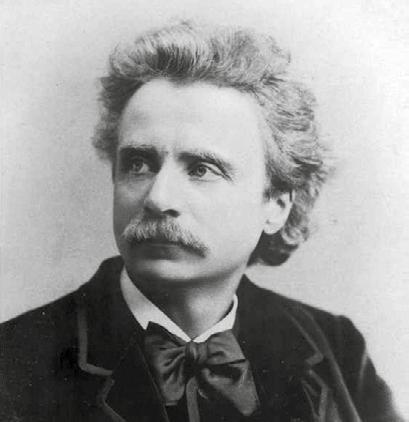
FIRST PERFORMANCE
Play and incidental music: Christiania (now Oslo), 24 February 1876
DURATION Both suites: 29 minutes
Suite No1 (published 1888)
1. Morning Mood
2. Åse’s Death
3. Anitra’s Dance
4. In the Hall of the Mountain King
Suite No2 (published 1893)
1. The Abduction of the Bride – Ingrid’s Lament
2. Arabian Dance
3. Peer Gynt’s Homecoming
4. Solveig’s Song
‘Composers such as Bach and Beethoven erected churches and temples on the heights,’ Edvard Grieg observed sagely, ‘whereas I want only to build dwellings for men in which they might feel happy and at home.’ So saying, he set the seal on a career that saw him synthesise home-grown, Nordic inspiration with Western composing techniques, putting Norway on the musical map once and for all.
Grieg struggled early in his career to make his unique and original voice heard above the European mainstream. Nationalist music was just beginning to assert itself, and Grieg found himself having to single-handedly compete with new music emerging from Russia, Poland, Czechoslovakia and Hungary. ‘The traditional way of life of the Norwegian people,’ he insisted, ‘ together with Norway’s legends, Norway’s history and Norway’s natural scenery, stamped itself on my creative imagination from my earliest years.’
Although he found it decidedly tough going at times, Grieg never lacked distinguished supporters. Franz Liszt, who sight-read Grieg ’s Piano Concerto with the greatest enthusiasm, thundered in a letter: ‘Persevere; I tell you. You have gifts – and do not let them intimidate you!’ Tchaikovsky was bowled over by the Norwegian’s natural flair: ‘What charm, what inimitable and rich musical imagery, what interest, novelty and independence.’ And Debussy was particularly fond of Grieg ’s piano miniatures, according to a 1903 edition of the Parisian periodical Gil Blas: ‘One has in one’s mouth the bizarre and charming taste of a pink sweet stuffed with snow.’
Grieg ’s main realm of fantasy was the miniature, exemplified by his enchanting series of 66 Lyric Pieces for solo piano and more than 170 songs, which evoke the sights and sounds of his homeland with almost tactile precision. Yet his constant struggles with depression led him to despair at one point that ‘many a time I go and stare up at the clouds as if I could find there the Norwegian drama in Norwegian music which I have dreamt of, which I have always believed I could create one day, but which I now begin to believe is fated to come from another’.
Indeed, when in 1874 celebrated playwright Henrik Ibsen invited Grieg to compose the incidental music for his groundbreaking five-act drama Peer Gynt, the composer was initially less than enthusiastic. Yet as he began making initial sketches it dawned on him that this might be the masterwork he had struggled for so long to achieve. In a letter to his friend Franz Beyer, he announced excitedly: ‘I’ve done something about the Hall of the Old Man of Dovre!’
Despite its seemingly endless flow of spontaneous invention, Peer Gynt caused Grieg endless problems – especially the theatre band orchestration. Indeed, following the death of his parents within a fortnight of one another, he even began to wonder whether he had lost his creative facility. His struggles were compounded by having to compose to the precise timings provided by the theatre management. Yet he eventually produced around 90 minutes of music, encouraged by the fact that Ibsen had advanced him a generous 50 per cent of his fee. The international acclaim achieved by the two
orchestral suites he later extracted from the finished score – presented in a different order than the original incidental music – left the remainder (much to Grieg ’s frustration) languishing on the outer fringes of the repertoire.
Suite No1 opens with Morning Mood, originally the opening section of the third act, which evokes a glorious sunrise over the Arabian Desert. There follows a heart-rending depiction of the death of Gynt’s beloved mother, Åse, and a sultry dance, whose exotic sensuality captures the beguiling charms of the Bedouin’s daughter, Anitra. The finale of the first suite sees Gynt trying desperately to escape the troll-infested terrors of the Hall of the Mountain King.
The second suite opens with the dramatic interruption of a wedding ceremony, during which the irresolute Gynt abducts the intended bride, Ingrid, who then despairs of her lot in a haunting lament. Following one last bewitching evocation of the Arabian Peninsula, Gynt manages to escape the seductive allure of the Middle East, returns to his homeland at full pelt and falls into the welcoming arms of his faithful Solveig.
© Julian Haylock
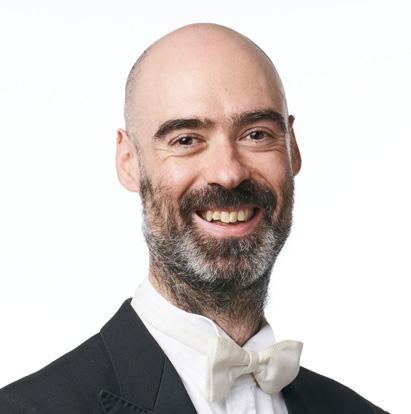
Adrian Wilson was appointed Principal Oboe of the RSNO in 2014, having previously held the Principal Oboe position in the RTÉ National Symphony Orchestra of Ireland.
A keen chamber musician, Adrian is the oboist and a founder member of Ensemble 360, a flexible eleven-piece ensemble that, since 2005, has been resident at Sheffield-based Music in the Round. Ensemble 360 regularly performs on BBC Radio 3, at London’s Wigmore Hall and at festivals around the UK.
Adrian is also in great demand as a guest principal, regularly working with orchestras including the City of Birmingham Symphony Orchestra, BBC Philharmonic, BBC Scottish Symphony Orchestra, BBC Symphony Orchestra, BBC National Orchestra of Wales, Royal Northern Sinfonia, Royal Liverpool Philharmonic Orchestra and Royal Philharmonic Orchestra.
A long time ago Adrian was twice a finalist in the BBC Young Musician of the Year competition and was Principal Oboe of both the National Youth Orchestra of Great Britain and the European Union Youth Orchestra.
Recent concerto performances include oboe concertos by Mozart, Vaughan Williams and Françaix’s L’Horloge de Flore with the RSNO, J S Bach’s Concerto for Oboe and Violin with Royal Northern Sinfonia and the Haydn Sinfonia Concertante and Donizetti Concertino with the RTÉ National Symphony Orchestra of Ireland.
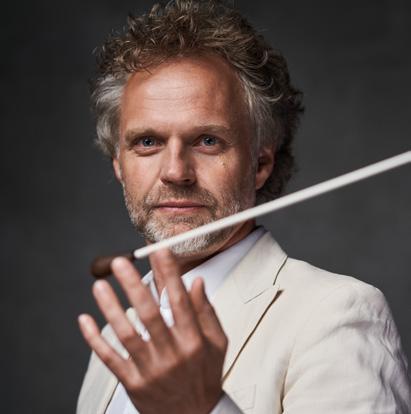
Danish conductor Thomas Søndergård has been Music Director of the RSNO since 2018, following six seasons as Principal Guest Conductor, and is Music Director of the Minnesota Orchestra. Between 2012 and 2018, he served as Principal Conductor of the BBC National Orchestra of Wales (BBC NOW), after stepping down as Principal Conductor and Musical Advisor of the Norwegian Radio Orchestra.
He has appeared with many notable orchestras in leading European centres, such as Berlin (Berliner Philharmoniker, RundfunkSinfonieorchester Berlin, Mahler Chamber Orchestra, Konzerthausorchester Berlin), Munich (Symphonieorchester des Bayerischen Rundfunk), Zurich (Tonhalle-Orchester Zürich), Leipzig (Gewandhausorchester), Paris (Orchestre National de France), London (London Philharmonic, BBC Symphony, London Symphony, Philharmonia Orchestra) and Amsterdam and Rotterdam (Royal Concertgebouw Orchestra, Netherlands Philharmonic, Rotterdam Philharmonic), and is a familiar figure in Scandinavia, with such orchestras as the Oslo Philharmonic, Gothenburg Symphony,
Danish National Symphony, Royal Stockholm Philharmonic, Swedish Radio Symphony, Finnish Radio Symphony and Helsinki Philharmonic. North American appearances to date have included the symphony orchestras of New York, Chicago, Cleveland, Cincinnati, Baltimore, St Louis, Toronto, Atlanta, Montreal, Vancouver, Houston and Seattle.
Following his acclaimed debut for Royal Danish Opera (Kafka’s Trial), he has since returned to conduct Die Walküre, Elektra, Le nozze di Figaro, Il barbiere di Siviglia, La bohème, Cunning Little Vixen and Il viaggio a Reims. He has also enjoyed successful collaborations with Norwegian Opera and Royal Swedish Opera. His Stockholm productions of Tosca and Turandot (both with Nina Stemme) led to his Bayerische Staatsoper debut, conducting main season and Opera Festival performances of Turandot with Stemme.
He made his Deutsche Oper Berlin debut with the world premiere of Scartazzini’s Edward II and has since returned for Berlioz’s Romeo and Juliet.
His discography covers a broad range of repertoire, including Carl Nielsen (Royal Danish Orchestra, Naxos Records); Poul Ruders (Arhus Symphony, Norwegian Radio, Royal Danish Opera (Kafka’s Trial), Da Capo and Bridge Records); Sibelius symphonies and tone poems with BBC NOW and Prokofiev and Richard Strauss with the RSNO, Linn Records; Lutosławski and Dutilleux concertos with cellist Johannes Moser and Rundfunk Sinfonieorchester Berlin (Pentatone); and Vilde Frang’s celebrated debut recording (WDR Köln, EMI).
In 2023, Thomas was a recipient of the Carl Nielsen and Anne-Marie Carl Nielsen’s Foundation award for his outstanding contribution to Danish musical life. In 2022, he was decorated with a prestigious Royal Order of Chivalry, the Order of Dannebrog (Ridder af Dannebrogordenen), by Margrethe II, Queen of Denmark.
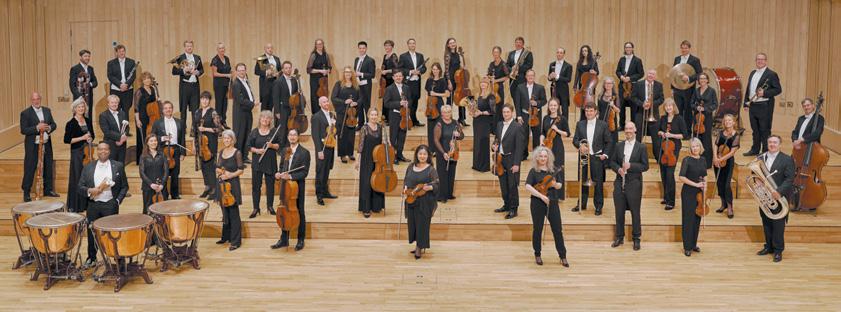
Formed in 1891 as the Scottish Orchestra, the company became the Scottish National Orchestra in 1950 and was awarded Royal Patronage in 1977. Many renowned conductors have contributed to its success, including Sir John Barbirolli, Walter Susskind, Sir Alexander Gibson, Neeme Järvi, Walter Weller, Alexander Lazarev and Stéphane Denève.
The Orchestra’s artistic team is led by Danish conductor Thomas Søndergård, who was appointed Music Director in 2018. In March 2024, Austrian-born conductor, composer and musician Patrick Hahn became the Orchestra’s Principal Guest Conductor.
The RSNO is supported by the Scottish Government and is one of the Scottish National Performing Companies. The Orchestra performs across Scotland, including concerts in Glasgow, Edinburgh, Dundee, Aberdeen, Perth and Inverness, and appears regularly at the Edinburgh International Festival and BBC Proms. The RSNO has made recent tours to the USA, China and Europe.
The RSNO has a worldwide reputation for the quality of its recordings, receiving a 2020 Gramophone Classical Music Award for Chopin’s
Piano Concertos (soloist: Benjamin Grosvenor), conducted by Elim Chan, two Diapason d’Or awards (Denève/Roussel 2007; Denève/Debussy 2012) and eight GRAMMY Award nominations. In recent years, the RSNO has increasingly recorded soundtracks for film, television and video games, with notable titles including Horizon: An American Saga (Warner Bros), Life on Our Planet (Netflix), Star Wars Outlaws (Ubisoft), Avatar: Frontiers of Pandora (Meta Quest VR) and The Woman King (Sony Pictures). The Orchestra records at its bespoke in-house facility, Scotland’s Studio, in Glasgow.
The RSNO believes that music can enrich lives, and aims to inspire, educate and entertain people throughout Scotland and beyond with its performances, recordings and engagement programmes. Supporting schools, families, young professionals and wider communities, the RSNO delivers high-quality initiatives for all ages and abilities, reaching over 68,000 people in 2023.
FIRST VIOLIN
Maya Iwabuchi LEADER
Lena Zeliszewska ASSOCIATE LEADER
Tamás Fejes ASSISTANT LEADER
Patrick Curlett
Liam Lynch
Alan Manson
Lorna Rough
Caroline Parry
Ursula Heidecker Allen
Susannah Lowdon
Veronica Marziano
Gillian Risi
Carole Howatt
Helena Rose
SECOND VIOLIN
Emily Davis
GUEST PRINCIPAL
Marion Wilson
Jacqueline Speirs
Anne Bünemann
Robin Wilson
Harriet Hunter
Paul Medd
Sophie Lang
Kirstin Drew
Nigel Mason
Colin McKee
Seona Glen
VIOLA
Tom Dunn
PRINCIPAL
Felix Tanner
Atico Razera
Susan Buchan
Beth Woodford
Claire Dunn
Francesca Hunt
Katherine Wren
Lisa Rourke
Sasha Buettner
CELLO
Pei-Jee Ng PRINCIPAL
Betsy Taylor
Yuuki Bouterey-Ishido
Robert Anderson
Rachael Lee
Sarah Digger
Gunda Baranuaskaitė
Niamh Molloy
DOUBLE BASS
Slawomir Grenda
GUEST PRINCIPAL
Michael Rae
Moray Jones
Alexandre Cruz dos Santos
Olaya Garcia Alvarez
Aaron Barrera-Reyes
FLUTE
Katherine Bryan PRINCIPAL
Oliver Roberts
Adam Richardson
Janet Richardson
PRINCIPAL PICCOLO
OBOE
Rainer Gibbons
GUEST PRINCIPAL
Peter Dykes
Henry Clay
PRINCIPAL COR ANGLAIS
CLARINET
Timothy Orpen PRINCIPAL
William Knight
Robert Digney
Duncan Swindells
PRINCIPAL BASS CLARINET
BASSOON
David Hubbard
PRINCIPAL
Catriona McDermid
Paolo Dutto
PRINCIPAL CONTRABASSOON
HORN
Kristina Yumerska
GUEST PRINCIPAL
Alison Murray
Andrew McLean
David McClenaghan
Martin Murphy
TRUMPET
Ben Jarvis
GUEST PRINCIPAL
Katie Smith
Brian McGinley
TROMBONE
Dávur Juul Magnussen
PRINCIPAL
Hannah Stell
Alastair Sinclair
PRINCIPAL BASS TROMBONE
TUBA
John Whitener PRINCIPAL
TIMPANI
Paul Philbert
PRINCIPAL
PERCUSSION
Simon Lowdon
PRINCIPAL
Tom Hunter
Julian Wolstencroft
Peter Murch
HARP
Elizabeth McNulty
Mary Reid
CELESTE
Lynda Cochrane

I am honoured and extremely proud to be Music Director of the RSNO. It is through the continued generosity of you, our friends, donors and supporters, that we can continue to achieve and realise the most ambitious goals of the Orchestra.
One of the wonders of the RSNO is how it brings high-quality music not only to concert halls, but to the wider community. From hospital settings to care homes, from our Astar app for families with newborns to our National Schools Concert Programme, our music touches so many lives in Scotland and beyond. Your support is the
RSNO Benefactors are beacons of philanthropic inspiration, providing truly transformative financial support to the Orchestra that enables us to build and deliver long-term strategic plans. Benefactors share the RSNO’s vision for orchestral music and work with us to drive
cornerstone of all that we do, as it allows us to continually build and develop.
Thank you for being part of this wonderful Orchestra’s journey, as we adapt and grow towards a bright future.
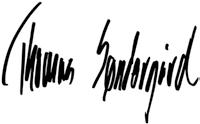
Thomas Søndergård MUSIC DIRECTOR, RSNO
the organisation forward, helping us to realise our future plans and ambitions.
Sir Ewan and Lady Brown
Gavin and Kate Gemmell
Kat Heathcote and Iain Macneil
Ms Chris Grace Hartness
The RSNO Conductors’ Circle is an inspirational group of individual supporters at the heart of the RSNO’s Individual Giving programme. Our members’ annual gifts enable us to realise the Orchestra’s most ambitious goals. Conductors’ Circle members support inspirational concert performances for our audiences alongside innovative education programmes in communities across Scotland, via our groundbreaking initiative Music for Life.
The RSNO is very grateful for the continued support of its Conductors’ Circle:
Ardgowan Charitable Trust
Stina Bruce Jones
Ian and Evelyn Crombie
Kenneth and Julia Greig
Carol Grigor and the Trustees of Dunard Fund
Bruce and Caroline Minto
David and Alix Stevenson
Eric and Karen Young
We would also like to thank those generous donors who wish to remain anonymous.
RSNO Patrons support individual musicians and members of the artistic team as well as advocating our work off the stage, from Learning and Engagement activity to commissioning new music. Becoming a Patron will bring you closer to the communities we serve across Scotland and will help to ensure that we maintain our position as one of Europe’s leading symphony orchestras.
RSNO Patrons
Geoff and Mary Ball
George Ritchie
Learning and Engagement Patrons
William Brown, W.S
The Dundee RSNO Circle Committee
Members of the Glasgow RSNO Circle
Neil & Nicola Gordon
Professor Gillian Mead, FRSE
Maurice & Nicola Taylor Charitable Trust
Chair Patrons
Chair Patrons are connected directly to the musicians on stage and get to enjoy privileged behindthe-scenes access. Our musicians truly appreciate the support they receive from their Chair Patrons and the brilliant opportunities they bring to the Orchestra.
Assistant Conductor
Derrick Morgan
The Solti Foundation Chair
First Violin
Maya Iwabuchi LEADER Dunard Fund Chair
Tamás Fejes ASSISTANT LEADER
The Bill and Rosalind Gregson Chair
Ursula Heidecker Allen
The James and Iris Miller Chair
Elizabeth Bamping
The WL and Vera Heywood Chair
Alan Manson
The Hugh and Linda Bruce-Watt Chair
Liam Lynch
Mr Kyle Anderson Weir
Second Violin
Marion Wilson
ASSOCIATE PRINCIPAL
The Nigel & Margot Russell Chair
Sophie Lang
The Ian & Evelyn Crombie Chair
Emily Nenniger
Mr Jamie & Kyle Anderson Weir
Viola
Tom Dunn PRINCIPAL
The Cathy & Keith MacGillivray Chair
Lisa Rourke SUB PRINCIPAL
The Meta Ramsay Chair
Francesca Hunt
The Rolf and Celia Thornqvist Chair
Beth Woodford
Mr Jamie & Kyle Anderson Weir
Cello
Pei-Jee Ng PRINCIPAL
Mr Jamie & Kyle Anderson Weir
Betsy Taylor
ASSOCIATE PRINCIPAL
The Maxwell Armstrong Chair
Rachael Lee
The Christine and Arthur Hamilton Chair
Double Bass
Michael Rae
ASSISTANT PRINCIPAL
James Wood Bequest Fund Chair
With thanks to the Gregor Forbes
John Clark Chair for their support of the RSNO Double Bass section
Flute
Katherine Bryan PRINCIPAL
The David and Anne Smith Chair
Oboe
Adrian Wilson PRINCIPAL
The Hedley Wright Chair
Peter Dykes
ASSOCIATE PRINCIPAL
Witherby Publishing Group Charitable Trust Chair
Cor Anglais
Henry Clay PRINCIPAL
In memory of a dear friend, Fiona H
Clarinet
Timothy Orpen PRINCIPAL
The Shirley Murray Chair
William Knight
ASSOCIATE PRINCIPAL
The David and Anne Smith Chair
Horn
PRINCIPAL
The Springbank Distillers Chair
Alison Murray
ASSISTANT PRINCIPAL
Mr & Mrs Pierre and Alison Girard
Martin Murphy
ASSISTANT PRINCIPAL
The Gordon Fraser Charitable
Trust Chair
David McClenaghan
The J & A Mitchell Chair
Trumpet
Christopher Hart PRINCIPAL
Ms Chris Grace Hartness
Katie Smith SUB-PRINCIPAL
The Lady Fraser Chair
Trombone
Dávur Juul Magnussen PRINCIPAL
The Mitchell’s Glengyle Chair
Timpani
Paul Philbert PRINCIPAL
Ms Chris Grace Hartness
Percussion
John Poulter
ASSOCIATE PRINCIPAL
The Dot and Syd Taft Chair
Staff
Chiko Parkinson
COMMUNITY SINGING ASSISTANT
Supported by ScotRail
We would like to acknowledge the great support of the RSNO Chair Patron Programme by Mr Hedley G Wright.
We are also grateful to those who give but who wish to remain anonymous.
If you would like more information or would like to discuss how you can become an RSNO Patron, please contact Constance Fraser, Head of Development (Individuals and Partnerships), at constance.fraser@rsno.org.uk
We would like to thank all those who continue to generously support the RSNO’s Play Your Part Appeal.
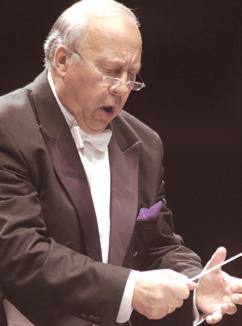

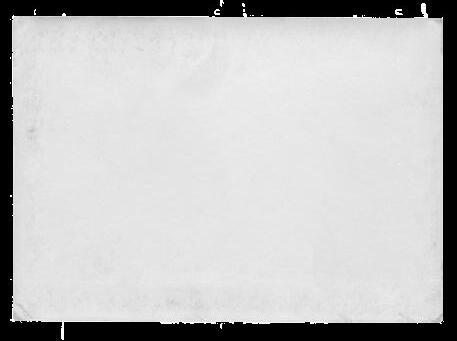
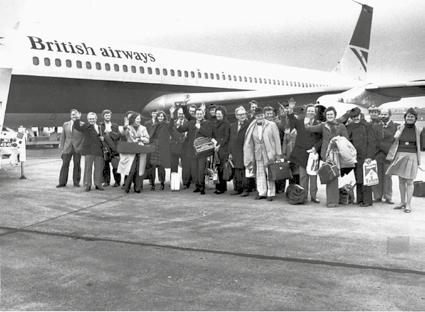
We all have special Musical Memories. It could be learning to play an instrument when you were a child, or a special piece of music that just left you breathless the first time you heard the Orchestra play it. Maybe it was seeing a soloist you had always wanted to hear, or just a great concert shared with friends. Memories such as these make music such an important part of our lives.
As a charity, our work relies on donations from our supporters and friends – whether performing world-class music on stage or engaging with children across Scotland in our National Schools Concert Programme – and we need your continued support.
By remembering the RSNO in your Will, you can help us share the joy of music with future generations and allow your passion for the Orchestra to live on.
It is easy to leave a gift. After you have made provisions for family and friends, please think of the Orchestra.
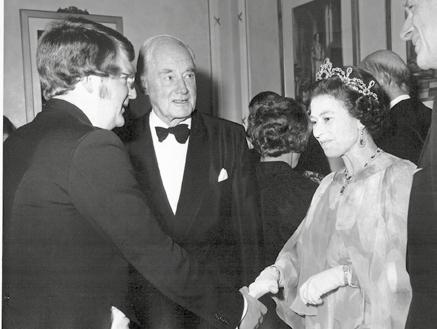
Your gift is important to us and to everyone in Scotland who enjoys music. Contact your solicitor to draft a will or add a codicil to your current will.
If your estate is subject to inheritance tax, a gift to a charity, such as the RSNO, is tax-free and will reduce the amount of tax payable to the Government. Please ask your solicitor for details.

For more information please visit rsno.org.uk/memories
If you would like to discuss this further, please contact Polly Lightbody, Individual Giving and Partnerships Officer, in the strictest confidence, at polly.lightbody@rsno.org.uk
To the many among you who have pledged to leave a gift already – thank you.
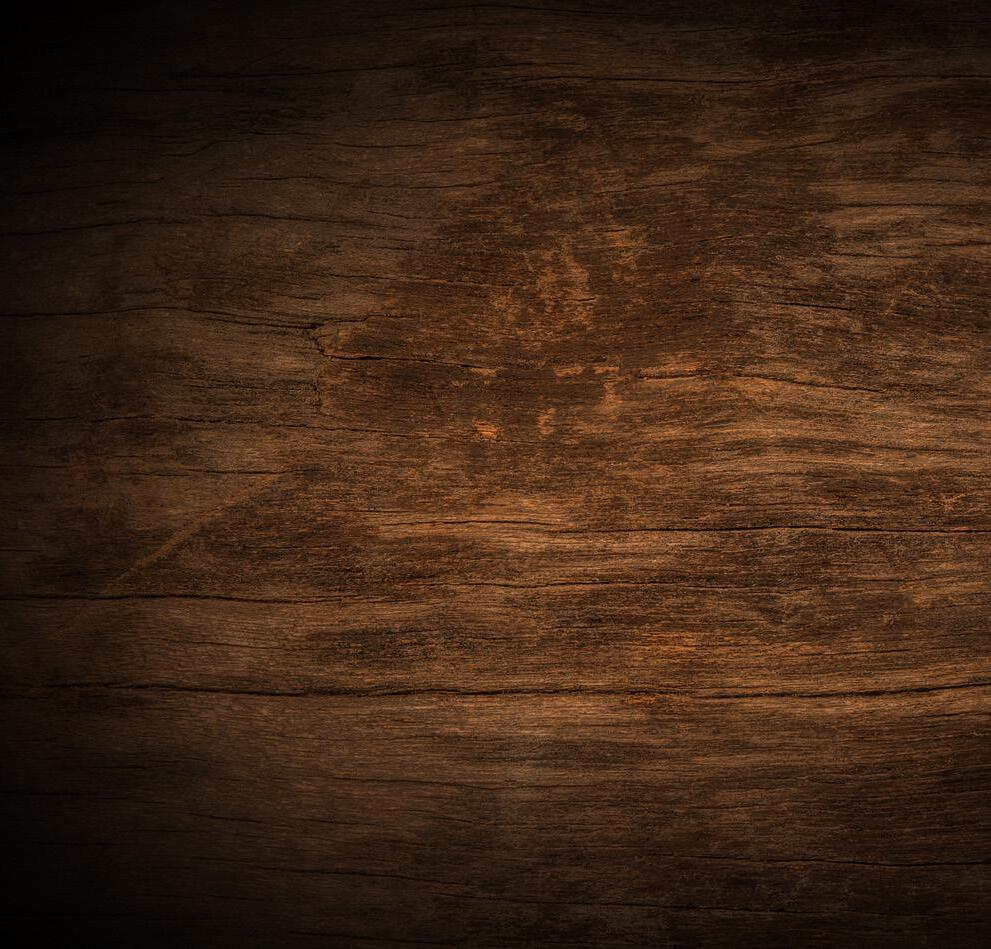

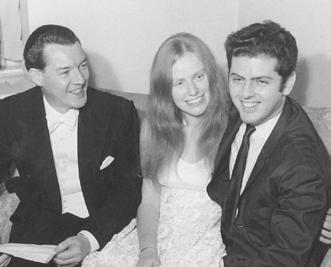
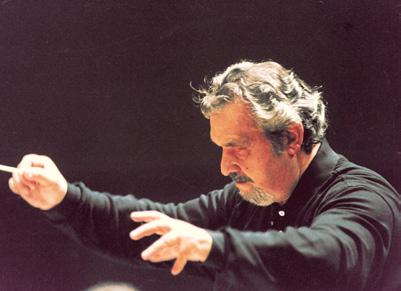
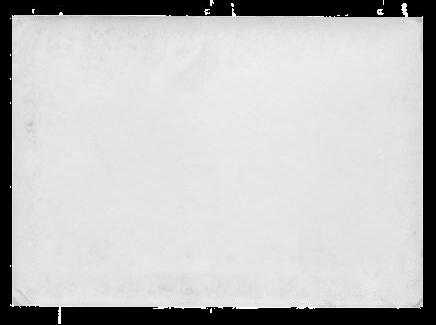




Charitable trusts and foundations have a distinguished history of supporting the RSNO, both on and off stage. From one-off donations for specific projects to multi-year funding for our flagship outreach initiatives, including the National Schools Concert Programme and Young Creatives, every grant in support of our work is truly appreciated. We are grateful to the following trusts and foundations for their generosity:
Aberdeen Endowments Trust
ABO Sirens Fund
Adam Mickiewicz Institute
Alexander Moncur Charitable Trust
Alma & Leslie Wolfson Charitable Trust
Balgay Children’s Society
The Boris Karloff Charitable Foundation
Boshier-Hinton Foundation
Brownlie Charitable Trust
The Castansa Trust
CMS Charitable Trust
The Common Humanity Arts Trust
Cookie Matheson Charitable Trust
Cruden Foundation
The David and June Gordon Memorial Trust
Dr Guthrie’s Association
The Dunclay Charitable Trust
The Educational Institute of Scotland
The Ettrick Charitable Trust
Fidelio Charitable Trust
Forteviot Charitable Trust
The Gaelic Language Promotion Trust
The Gannochy Trust
Garrick Charitable Trust
The Gordon Fraser Charitable Trust
Harbinson Charitable Trust
Hobart Charitable Trust
Hope Scott Trust
The Hugh Fraser Foundation
James Wood Bequest Fund
Jean & Roger Miller’s Charitable Trust
Jennie S Gordon Memorial Foundation
Jimmie Cairncross Charitable Trust
Miss Jean R Stirrat’s Charitable Trust
The Music Reprieval Trust
N Smith Charitable Settlement
Nancie Massey Charitable Trust
New Park Educational Trust
The Noel Coward Foundation
Northwood Charitable Trust
The Nugee Foundation
P F Charitable Trust
Pear Tree Fund for Music
The PRS Foundation
Pump House Trust
Q Charitable Trust
The R J Larg Family Trust
The Ronald Miller Foundation
The Rowena Alison Goffin Charitable Trust
The Scops Arts Trust
Scott-Davidson Charitable Trust
Scottish Enterprise
The Solti Foundation
Souter Charitable Trust
Stanley Morrison Trust
The Steel Charitable Trust
Stevenston Charitable Trust
Sylvia Aitken’s Charitable Trust
Tay Charitable Trust
Thomson Charitable Trust
Tillyloss Trust
Vaughan Williams Foundation
Verden Sykes Trust
W A Cargill Fund
W M Sword Charitable Trust
Walter Scott Giving Group


John Mather Charitable Trust
John Scott Trust Fund
JTH Charitable Trust
Leach Family Charitable Trust
Leng Charitable Trust
Lethendy Charitable Trust
Marchus Trust
Mary Janet King Fund (FS Small Grants)
McGlashan Charitable Trust
MEB Charitable Trust
The Meikle Foundation
Mickel Fund
Miss E C Hendry Charitable Trust
Mrs J Y Nelson Charitable Trust
The Wavendon Foundation
The W M Mann Foundation
W M Sword Charitable Trust
The Zich Trust
We are also grateful to a number of trusts that wish to stay anonymous.
If you would like more information about our work and how you can make a difference, please contact Miranda Behrens, Head of Development (Trusts and Projects), at miranda.behrens@rsno.org.uk
Our Circle Members are at the centre of the RSNO. Your membership helps to support the future of the RSNO while sharing the joy of music both on and off stage.
When you join the RSNO Circle you enhance your relationship with the Orchestra and get exclusive updates from our musicians. If you would like to find out more about joining the Circle, please visit rsno.org.uk/circle or get in touch with Polly Lightbody, Individual Giving and Partnerships Officer, at polly.lightbody@rsno.org.uk
Ms Catherine Y Alexander
Mrs A M Bennett
Mr Alan and Mrs Carolyn Bonnyman
Dame Susan and Mr John Bruce
Stephen and Morny Carter
Francesca and Eoghan Contini
Mackie
Sir Sandy and Lady Crombie
Gavin and Kate Gemmell
Dr M I and Mrs C R Gordon
Scott and Frieda Grier
Judith and David Halkerston
Iain MacNeil and Kat Heathcote
Miss A McGrory
Miss M Michie
Mr James Miller CBE
Mrs Abigail Morrison
Nicholas and Alison Muntz
Meta Ramsay
Mr and Mrs W Semple
Mr Ian Taft
Claire and Mark Urquhart
Raymond and Brenda Williamson
Margaret Duffy and Peter Williamson
Symphony
William & Elizabeth Berry
Mr John Brownlie
Mr A Campbell
Dr K Chapman and Ms S Adam
Mr W G Geddes
Mr I Gow
Mr J D Home
Professor J Mavor
Mrs A McQueen
Mr Iain Percival
Mr and Mrs David Robinson
Miss D Blackie
Neil and Karin Bowman
Dr C M Bronte-Stewart
Dr F L Brown
Mr and Mrs Burnside
David Caldwell
Ms H Calvert
Ross Cavanagh
Myk Cichla
Dr J Coleiro
Mr and Mrs B H Cross
Christine and Jo Danbolt
Mr P Davidson
Steven J Davis
Mr C Ffoulkes
Mr and Mrs M Gilbert
Lord and Lady Hamilton
Mrs S Hawthorn
P Hayes
Dr and Mrs P Heywood
Ms H Kay
Mr and Mrs W Kean
Nicholas Kilpatrick
Terry & Joan Cole
Christine Lessels
Mr D MacPherson
Mrs K Mair
Mr and Mrs Marwick
Mr S Marwick
Mrs Sandra Maxwell
Mr and Mrs G McAllister
Dr A H McKee
Mr Ros McLoughlin
Morag Miller
Mrs B Morinaud
Dr and Mrs D Mowle
Mr KR and Dr CC Parish
Ms A and Miss I Reeve
Mrs E Robertson
Miss L E Robertson
Dr and Mrs G K Simpson
Norma & Duncan Smith
Mr and Mrs A Stewart
David and Helen Strachan
Mr G Stronach
Dr G R Sutherland
Mr I Szymanski
Mr and Mrs J B Watson
Mr and Mrs D Weetman
Mr and Mrs Chris and Jane Wood
Sonata
Mr K Allen
Jenny Beattie
Dr A D Beattie
Mrs H Benzie
Mr R Billingham
Lord and Lady Borthwick
John Bradshaw and Shiona Mackie
Mrs Bryan
Mrs C M Campbell
Miss S M Carlyon
Amanda Carter-Fraser
Lady Coulsfield
Adam and Lesley Cumming
Dr J K and Mrs E E Davidson
Mr and Mrs K B Dietz
Mrs C Donald
J Donald and L Knifton
Colin Douglas
Mr John Duffy
Mr and Mrs M Dunbar
Mr R M Duncan
Brigadier and Mrs C C Dunphie
Mrs E Egan
Mr R Ellis
Mr R B Erskine
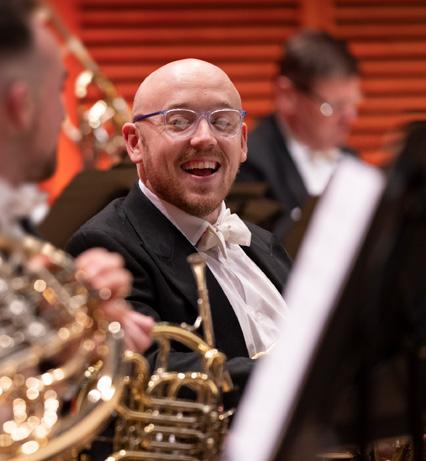
Dr E Evans
Mr D Fraser
Ms J Gardner
Philip & Karen Gaskell
Mrs M Gibson
Mrs M Gillan
Mrs JK Gowans
Dr J and Mrs H Graham
Professor and Mrs A R Grieve
Dr P J Harper
Dr N Harrison
Mr and Mrs R J Hart
Bobby and Rhona Hogg
Mr and Mrs F Howell
Mrs A Hunter
Professor R N Ibbett
Professor and Mrs E W Laing
Ms K Lang
Robert Love
Dr D A Lunt
Mr and Mrs J Martin
Ms S McArthur
Mr G McCormack
Gavin and Olive McCrone
Jean McCutcheon
Mrs M McDonald
Mr M McGarvie
Mrs S McGeachan
Dr Colin McHardy
Mr G McKeown
Ms H L McLaren
Margaret McLay
Libby McLean
Mr D McNaughton
Mr and Mrs B Mellon
Kathryn Michael
Mr I Mills

Mrs P Molyneaux
Mr B Moon
Kenneth M. Murray
Bruce and Christine Nelson
Mr and Mrs K O’Hare
Mr and Mrs K Osborne
Dr G Osbourne
Mr A Ownsworth
Mr R Parry
Misses J and M Penman
Mr J W Pottinger
Miss J A Raiker
Mr M Rattray
Ms F Reith
Dr and Mrs D Robb
Mrs A Robertson
Anne Robertson
Ms A Robson
Sheriff Linda Ruxton
Mrs J Shanks
Mr J A Shipley
Dr M J and Mrs J A Shirreffs
Richard and Gillian Shirreffs
Mr E Simmons and Mrs R Nicolson
Mrs E Smith
Mr M Smith
Dr and Mrs B Stack
Mrs Lorna Statham
Mrs R F Stewart
Rev N and Mr R Stewart
Mr I Strachan
Mr and Mrs B Tait
Dr and Mrs T Thomson
Mr C Turnbull
Dr Morag War
Nelson and Barbara Waters
Mr W Waters
Alan Weddell
Mr G West
Miss M Whitelaw
Philip Whitely and Robert H Mackay
Roderick Wylie
Mr R Young
Thank you to all our members of the Circle, including Overture members and those who wish to remain anonymous.
FUNDERS




CORPORATE SUPPORTERS



PRINCIPAL MEDIA PARTNER
PRINCIPAL TRANSPORT PARTNER

CHARITY PARTNER
PARTNERS

BROADCAST PARTNER
Glasgow Chamber of Commerce • Institute of Directors • Scots Magazine The Scottish Council for Development & Industry • Smart Graphics
PROJECT PARTNERS
Alzheimer Scotland • Black Lives in Music • Children’s Hospice Association • Children’s Classic Concerts • Classic FM • Douglas Academy Dunedin Consort • Education Scotland • Gig Buddies • Goethe-Institut Glasgow • Hebrides Ensemble • Luminate Music Education Partner Group • ParentZone • Royal Conservatoire of Scotland • Scottish Book Trust • Scottish Refugee Council
Sistema Scotland • St Mary’s Music School • Starcatchers • Tayside Healthcare Arts Trust • The Scottish Wildlife Trust University of Edinburgh • V&A Dundee • Visible Fictions
CHAIR SPONSORS


If you would like more information about sponsorships, corporate partnerships or fundraising events with the RSNO, please contact Constance Fraser, Head of Development (Individuals and Partnerships), at constance.fraser@rsno.org.uk
PATRON
His Majesty The King
RSNO BOARD OF DIRECTORS
Elected Directors
Gregor Stewart
CHAIR
Gail Blain
HONORARY TREASURER
Ruth Binks
Kayla-Megan Burns
CHIEF EXECUTIVE
Alistair Mackie
Nicola Kelman
EXECUTIVE ASSISTANT
CONCERTS
Graham Bell
PLANNING OFFICER
Megan Bousfield
LIBRARY ASSISTANT
Ashley Holland
STAGE MANAGER
Emma Hunter
DEPUTY ORCHESTRA MANAGER
Ewen McKay
HEAD OF ORCHESTRA MANAGEMENT
Richard Payne
LIBRARIAN
David Rees
DRIVER AND ORCHESTRA TECHNICIAN
Tammo Schuelke
HEAD OF PLANNING
Craig Swindells
HEAD OF PRODUCTION
Matthias Van Der Swaagh
CONCERTS ADMINISTRATOR
Xander van Vliet
PLANNING MANAGER
Christine Walker
CHORUS MANAGER
LEARNING AND ENGAGEMENT
Andrew Stevenson
DIRECTOR OF ENGAGEMENT
Rosie Kenneally
CREATIVE PRODUCER FOR LEARNING
Ken Hay
Kat Heathcote
Don Macleod
David Robinson
John Stewart
David Strachan
Cllr Edward Thornley
NOMINATED DIRECTOR
Julia Miller
COMPANY SECRETARY
Maisie Leddy
Player Directors
Katherine Bryan
Christopher Hart
David Hubbard
Sophie Lang
David McClenaghan
Lorna Rough
RSNO COUNCIL
Baroness Ramsay of Cartvale CHAIR
Ms Ruth Wishart
ENGAGEMENT COORDINATOR
Rachel Naismith
ENGAGEMENT COORDINATOR
Dr Jane Donald
DIRECTOR OF EXTERNAL RELATIONS
Lisa Ballantyne
PARTNERSHIPS OFFICER
Miranda Behrens
HEAD OF DEVELOPMENT (TRUSTS AND PROJECTS)
Ian Brooke
PROGRAMMES EDITOR
Rosie Clark
COMMUNICATIONS AND MARKETING OFFICER
Jessica Cowley
MARKETING MANAGER
Carol Fleming
HEAD OF MARKETING
Constance Fraser
HEAD OF DEVELOPMENT (INDIVIDUALS AND PARTNERSHIPS)
Katie Kean
EXTERNAL RELATIONS ADMINISTRATOR
Polly Lightbody
INDIVIDUAL GIVING AND PARTNERSHIPS OFFICER
Graham Ramage
GRAPHICS DESIGNER
Kirsten Reid
TRUSTS AND PROJECTS COORDINATOR
Sam Stone
INFORMATION SERVICES MANAGER
Ross Williamson
VIDEO PRODUCER (MARKETING)


YOUTH ASSEMBLY
George Hillier
Amy McColl
Hazel Sharp
Ailsa Smith
Jessica Smith
Penny Snell
Rachel Sunter
Ailsa Thompson
Danny Urquhart
FINANCE AND CORPORATE SERVICES
Angela Moreland
CHIEF OPERATING OFFICER
Abby Dennison
FINANCE ADMINISTRATOR
Ted Howie
FACILITIES COORDINATOR
Lorimer Macandrew
VIDEO PRODUCER
Sam McErlean
ASSISTANT SOUND ENGINEER
Irene McPhail
ACCOUNTS AND PAYROLL ASSISTANT
Calum Mitchell
ASSISTANT VIDEO PRODUCER
Hedd Morfett-Jones
DIGITAL MANAGER
Susan Rennie
HEAD OF FINANCE
Gabriel Smith
SOUND ENGINEERING PLACEMENT
Jade Wilson
FINANCE ASSISTANT
Royal Scottish National Orchestra 19 Killermont Street
Glasgow G2 3NX
T: +44 (0)141 226 3868
W: rsno.org.uk
Scottish Company No. 27809
Scottish Charity No. SC010702

Weekdays from 06:30am
